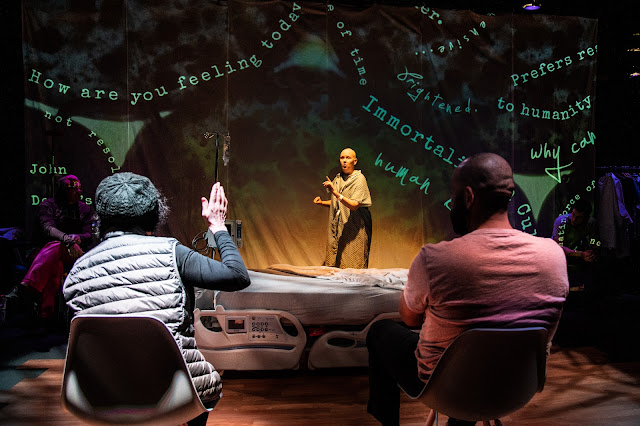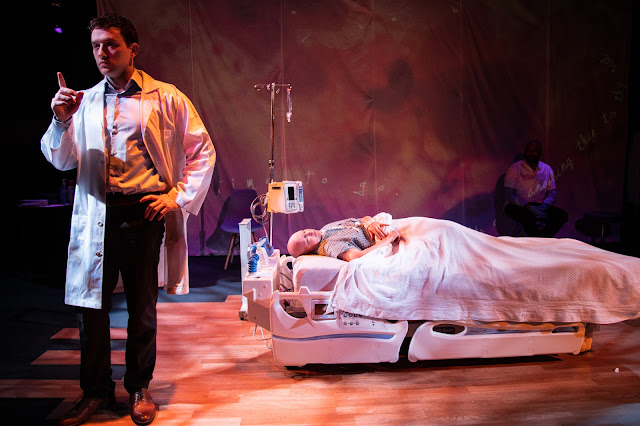Review: Bravery is the Soul of "Wit"
Wit
Written by Margaret Edson
Directed by Brynn Asha Walker
Presented by The Seeing Place Theater at The Paradise Factory
64 East 4th Street, Manhattan, NYC
December 30, 2021-January 16, 2022
 |
| Janice Hall, Erin Cronican, & Christopher James Murray. Photo by Russ Rowland |
The Seeing Place Theater (TSP), a group dedicated to "actor-driven, social justice theater" that inspires audiences to action, begins its twelfth season with a riveting production of Margaret Edson's Pulitzer Prize-winning play Wit. Wit's narrator-protagonist Vivian Bearing (Erin Cronican) holds a doctorate in 17th-century English literature, and her research focuses on John Donne, especially on his sequence of Holy Sonnets, composed in 1609-1610 and circulated in manuscript. Firmly established in her career at 50, Bearing has been diagnosed with Stage IV ovarian cancer, and the certainties of scansion seem both more and less important than ever before as she brings her intelligence, anger, and humor to bear on reckoning with her life and her death. In the hands of TSP, Wit’s balance of pain and humor, of humanity and rigor, is handled deftly, and the result is a strikingly original and compelling staging of a play with which audiences may be familiar.
Bearing says that Donne's work is characterized by outbreaks of wit, a flexible, multi-layered concept, and that work acts as both a touchstone for and a parallel to Bearing. Donne's Holy Sonnets display what Dr. Jason Posner (Robin Friend), a former student of Bearing's and current research fellow under her physician Dr. Kelekian (Christopher James Murray), cleverly calls "salvation anxiety" (more than a decade later, a severe illness would prompt Donne to produce the further meditations on mortality of Devotions Upon Emergent Occasions). The play raises the possibility that the complexity of Donne's sonnets function as a barrier against such anxiety. Does Donne hide behind wit? Does Bearing? Bearing from the first uses her literary training as a defense and a way of approaching/coping, and certainly rigor, that academic favorite, plays such a role, which becomes increasingly clear as she reflects upon her past devotion to being uncompromising in her life and work. Bearing's scholarly mentor, E. M. Ashford (Janice Hall), emphasizes detailed, painstaking labor in her approach to Donne, and while such an approach may lead, via punctuation analysis, to insights such as the reduction of death to a "comma" in Holy Sonnet 10, it also, as Posner, who has his own issues with emotional connection, observes, takes the poetry out of poetry.
 |
| Robin Friend & Erin Cronican. Photo by Russ Rowland |
TSP is a theater collective impacted by the experiences of each of its members: in addition to Cronican, Friend is also a cancer survivor. In a gesture that breaks down boundaries of stage and performance, audience members are invited to respond on a 3x5 card, which will be added to the memorial wall near the theater's entrance, to how cancer has touched their lives, and they can also purchase a memorial candle, for a donation of $1 or more, which will be lit throughout the show's run. The program notes that "wit" "originally meant witness," and this Wit can indeed feel like a collective act of bearing (pun intended?) witness to something that is simultaneously visceral and intellectual.




great!
ReplyDelete